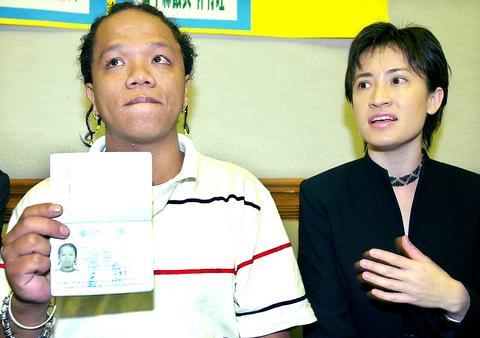In order to allow certain individuals born before 1982 gain Taiwanese citizenship, Democratic Progressive Party (DPP) Legislator Hsiao Bi-khim (蕭美琴) yesterday said she would push for changes in the Nationality Law (國籍法).
Revisions made in 2000 to Article 2 of the law allowed children with one Taiwanese and one foreign parent to obtain Republic of China citizenship, but the revisions only covered people who were children at the time, meaning that the revisions offered nothing to people born before 1982.

PHOTO: LIAO CHEN-HUI, TAIPEI TIMES
Hsiao, who herself is the product of a cross-cultural marriage, said that her wish to revise the law is inspired by the case of George Laverne Jennings, a 28-year old man who, despite having a Taiwanese mother and having lived in Taiwan most of his life, has not been able to obtain Taiwanese citizenship.
Jennings -- or "Little Black," as he is affectionately known to his Taiwanese friends -- is the child of an African-American father and a Taiwanese woman.
He has lived in Taiwan for 19 years and speaks fluent Taiwanese and Chinese. Because his father was American and because he himself was an adult before the law was revised in 2000, Jennings cannot claim Taiwanese citizenship.
Jennings has US citizenship, but is in limbo regarding his status in Taiwan. He does not have a national identity card because he and his mother neglected to fill out forms regarding his stay in the country when he was in high school. Without an identity card, he has been unable to hold a regular job.
At the time that Jennings came to Hsiao's attention, Jennings had overstayed by eight years his legally-sanctioned stay in Taiwan and was facing deportation.
Thanks to the help of local politicians including Hsiao, Jennings has been given an exemption and will be able to stay in Taiwan.
Returning from a brief trip from Hong Kong yesterday, Jennings said that he would begin taking language classes at Feng-chia University.
"I am already a Taiwanese," Jennings said.
"As long as I can get a national identity card, I am even willing to do military service," he said.

A preclearance service to facilitate entry for people traveling to select airports in Japan would be available from Thursday next week to Feb. 25 at Taiwan Taoyuan International Airport, Taoyuan International Airport Corp (TIAC) said on Tuesday. The service was first made available to Taiwanese travelers throughout the winter vacation of 2024 and during the Lunar New Year holiday. In addition to flights to the Japanese cities of Hakodate, Asahikawa, Akita, Sendai, Niigata, Okayama, Takamatsu, Kumamoto and Kagoshima, the service would be available to travelers to Kobe and Oita. The service can be accessed by passengers of 15 flight routes operated by

Alain Robert, known as the "French Spider-Man," praised Alex Honnold as exceptionally well-prepared after the US climber completed a free solo ascent of Taipei 101 yesterday. Robert said Honnold's ascent of the 508m-tall skyscraper in just more than one-and-a-half hours without using safety ropes or equipment was a remarkable achievement. "This is my life," he said in an interview conducted in French, adding that he liked the feeling of being "on the edge of danger." The 63-year-old Frenchman climbed Taipei 101 using ropes in December 2004, taking about four hours to reach the top. On a one-to-10 scale of difficulty, Robert said Taipei 101

Taiwanese and US defense groups are collaborating to introduce deployable, semi-autonomous manufacturing systems for drones and components in a boost to the nation’s supply chain resilience. Taiwan’s G-Tech Optroelectronics Corp subsidiary GTOC and the US’ Aerkomm Inc on Friday announced an agreement with fellow US-based Firestorm Lab to adopt the latter’s xCell, a technology featuring 3D printers fitted in 6.1m container units. The systems enable aerial platforms and parts to be produced in high volumes from dispersed nodes capable of rapid redeployment, to minimize the risk of enemy strikes and to meet field requirements, they said. Firestorm chief technology officer Ian Muceus said

MORE FALL: An investigation into one of Xi’s key cronies, part of a broader ‘anti-corruption’ drive, indicates that he might have a deep distrust in the military, an expert said China’s latest military purge underscores systemic risks in its shift from collective leadership to sole rule under Chinese President Xi Jinping (習近平), and could disrupt its chain of command and military capabilities, a national security official said yesterday. If decisionmaking within the Chinese Communist Party has become “irrational” under one-man rule, the Taiwan Strait and the regional situation must be approached with extreme caution, given unforeseen risks, they added. The anonymous official made the remarks as China’s Central Military Commission Vice Chairman Zhang Youxia (張又俠) and Joint Staff Department Chief of Staff Liu Zhenli (劉振立) were reportedly being investigated for suspected “serious